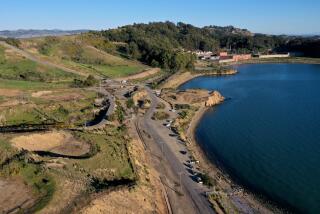Redlands Sues Over Land Dispute
- Share via
SACRAMENTO — Redlands officials have fired the latest salvo in a long-running dispute over a controversial “doughnut hole,” suing the state and calling into question campaign contributions made to Gov. Gray Davis.
The “hole” at issue consists of about 1,000 acres of aging orange groves and vacant land, surrounded by the city of Redlands, in San Bernardino County.
Although it is in an unincorporated area, it falls under the city’s sphere of influence. The geographical catch has given rise to a battle of more than a decade between the city and the orange grove’s numerous landowners, including Southern California real estate figure Ed Roski Jr.
Roski’s Majestic Realty Co. is part of a partnership that wants to build a shopping center on the site. But Roski and other doughnut hole landowners have been unable to reach an agreement with the city of Redlands to provide sewer and water services to the block of real estate--a key requisite for development.
Gov. Davis intervened last month by signing legislation that in effect allows San Bernardino County to provide water and sewer services to the doughnut hole. Redlands city officials fired back last week with a lawsuit asking a court to declare the law unconstitutional.
Eyebrows are also being raised around Redlands by the estimated $80,000 in campaign contributions that Davis received from Majestic Realty and the company’s president, Roski, during the first six months of this year.
The contributions to Davis include two payments totaling $60,000 by Majestic Realty and nearly $21,000 in nonmonetary contributions by Roski.
“I can’t speak for the governor and whether it influenced his decision or not, but it certainly implies it,” said Redlands Mayor Pat Gilbreath.
Davis spokeswoman Hilary McLean brushed aside suggestions of a quid pro quo.
“Gov. Davis’ policy decisions have no relationship whatsoever to any campaign contributions he might have received,” McLean said. “Furthermore, his position on this issue has been entirely consistent.”
Davis vetoed a nearly identical bill last year. At the time, he warned that unless the city and landowners reached an agreement he would sign a similar bill this year.
Developing the doughnut hole, Davis said in his signing message, is a crucial step toward creating jobs in the Inland Empire, where thousands of jobs were lost because of the closing of the nearby Norton Air Force Base.
Tim Chaikovsky, Majestic’s vice president of business affairs, said the contributions to Davis were made out of Roski’s belief that the governor is doing a good job.
“Ed supports people that basically are supportive of business growth in the state of California,” Chaikovsky said. “That’s why he supports Gray.”
Chaikovsky added that doughnut hole landowners are discussing water and sewer services with the city of Redlands.
“It was a real surprise to me when they filed the lawsuit,” Chaikovsky said. “It doesn’t eliminate the discussions, but it also doesn’t make for a comfortable environment.”
The lawsuit alleges that the Legislature violated the state’s Constitution by enacting a special law that applies exclusively to the doughnut hole on issues including sphere of influence, compliance with local zoning and permit requirements.
Geoffrey L. Robinson, a Walnut Creek attorney who filed the suit on behalf of the city of Redlands, said that, for each of the special provisions included in the new law, there already exists a general law that applies to the rest of the state.
Assemblyman Brett Granlund (R-Yucaipa), who shepherded the bill through the Legislature, described the lawsuit as frivolous, noting that the Legislature regularly passes laws that affect a given city, county or region.
“It just demonstrates that obviously there’s something in the water that kills brain cells in the city of Redlands,” Granlund said.
More to Read
Sign up for Essential California
The most important California stories and recommendations in your inbox every morning.
You may occasionally receive promotional content from the Los Angeles Times.













